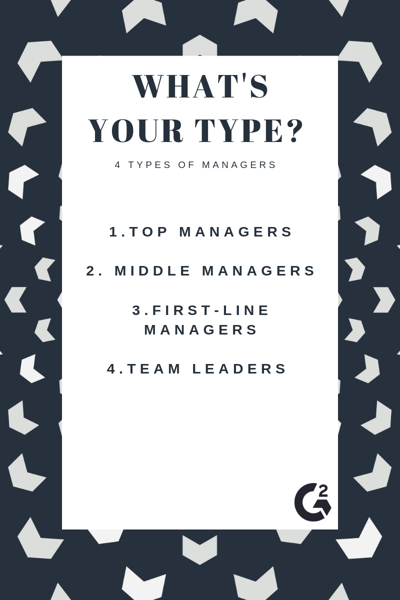We don’t always like to think we have a “type.”
It’s more fun to believe we’re unpredictable, that we’re open to whatever life throws our way. Realistically, though, we have our preferences. We all have a type, something we know we like most.
4 types of managers
- Top managers
- Middle managers
- First-line managers
- Team leaders
I’m referring, of course, to types of managers and their different project management styles. What did you think I was talking about?
Whether you’re a manager-in-training, or an executive looking to hire someone with highly developed project management skills, use this article as a reference point for the various types of managers that make up a full team.
Types of managers
In the article on project management styles, we go through the various philosophies project managers hold when leading a team. In this article, we’re going to discuss the more technical titles and roles associated with a typical management structure.

It should be noted that I am explaining this in reference to a traditional, top-down structure, wherein management is vertical, and all authority trickles down from the executive positions.
1. Top managers
Top managers include, as you’d suspect, anyone at the executive level of a company. Think anyone with a “C” in their title — chief executive officer (CEO), chief financial officer (CFO), chief marketing officer (CMO), chief operations officer (COO), chief technology officer (CTO), etc.
In this level of management, executives are focused on the long-term success of the organization. They make hiring and business decisions with the intent to keep the company afloat, and thriving.
They are also in charge of executive decisions such as who to partner with, if and when to go public, and whether it’s time to rebrand.
2. Middle managers
Don’t let the term “middle manager” fool you; this level of employment is still a lot of work. While middle managers typically report to the top managers, they still have a lot of decision-making power in the company. Job titles of middle managers can include director, chief supervisor, and department head.
Among other things, middle managers are responsible for linking first-line managers and their concerns to those at the executive level. They also serve as mentors for first-line managers, training employees for future leadership positions.
Middle managers take the objectives and goals from the top and create plans to put these objectives into motion.
3. First-line managers
First-line managers work the closest with regular project team members and other employees. As far as managers go, these are considered to be “entry-level” and are responsible for holding employees accountable for their goals.
First-line managers handle internal work only, and aren’t responsible for larger business decisions. Because they work so closely with the employees, first-line managers are often the ones to communicate concerns to middle management.
Some examples of first-lien managers are office managers, assistant managers, editorial managers, shift managers, etc.
4. Team leaders
Team leaders, often referred to just as “team leads,” are managers who specialize in a specific project or task. Team leaders are responsible for many of the logistics of the work: detailed project timelines, onboarding, and other member training, assigning tasks to team members, monitoring progress.
Don’t be fooled: while a team leader may be situated at the “bottom” of the totem pole, they are still vital to a team’s success. Just imagine trying to hit your project milestones without a clear project schedule.
There are no small types
As you can see, every manager plays a vital role in the overall operations of an organization. Successful companies focus on hiring talented individuals, and building up their skills over time!
 by Maddie Rehayem
by Maddie Rehayem
 by Maddie Rehayem
by Maddie Rehayem
 by Soundarya Jayaraman
by Soundarya Jayaraman